Archive for ‘Genealogy’ Category
Paper Doll Interviews the Genealogy Organizers
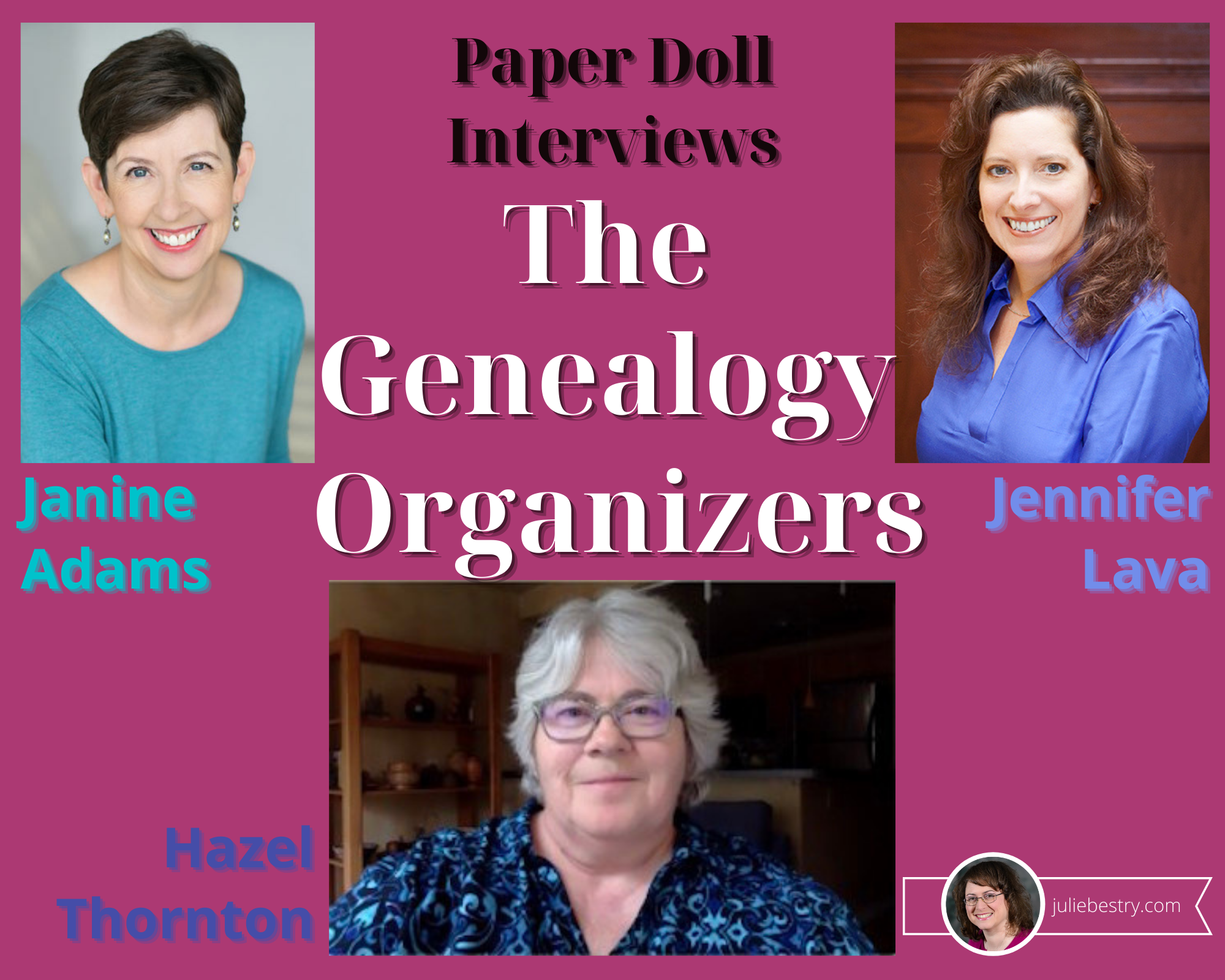
Professional organizers have a variety of specialties. Some focus on particular types of clients (students, senior citizens, people with ADHD), while others specialize in particular spaces (offices, kitchens, closets, warehouses). One of the newer specialities within our field is genealogy organizing, and today I’m interviewing three experts in the field.
I got the idea when Jennifer Lava, one of my colleagues, offered to do a little research into my family history and found an interesting tidbit about my maternal great-aunt’s wedding cake. Jennifer and our colleagues and friends Janine Adams, CPO® and Hazel Thornton have some real insight to share about the nexus of organizing and genealogy. (Insights into Paper Doll‘s family history are just a bonus.)
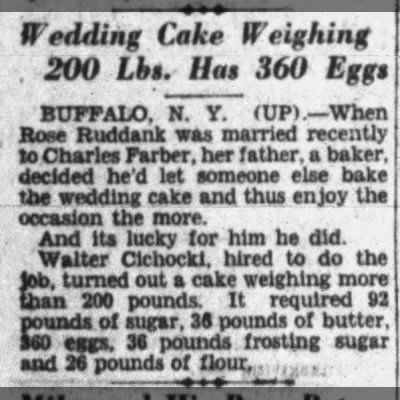
Paper Doll‘s great-aunt’s wedding cake. Mmmm.
What’s your professional background, and what got you involved in organizing and productivity?
Hazel Thornton: I joined NAPO the same month I got laid off from the telephone company after 21-1/2 years: December 2004. Why wait to start doing what I had only months earlier identified as what I really wanted to do when I grew up? As it turns out, the combo of engineering, drafting, and fine arts degrees, plus telephone company experience, is a good pathway to becoming a professional organizer!
Janine Adams: I started Peace of Mind Organizing® in 2005, after ten years as a freelance pet writer. Before that I worked in media relations for the Missouri Botanical Garden and before that I worked for a non-profit in DC where I literally got to travel around the world. All of those positions required keen organizational skills. (In the late 1980s I planned a conference in Nairobi, Kenya, from my desk in Washington, D.C. that had 15 participants from 11 countries. And I managed to do it without the internet!)
I started my organizing business after the publishing industry chewed me up and spit me out. When I was working on my last book (my eighth), I was feeling disrespected and disillusioned and I knew the only way I could get through it was to know it was my last book. I fantasized about what I would do next and was struck by the idea of starting an organizing business. I wrote down three things I thought it would bring me that I wasn’t getting as a writer: The ability to help people directly and tangibly; respect for my expertise; and payment at time of service. Thankfully, I was right and it’s worked out nicely!
Jennifer Lava: I worked in both retail and administrative positions in both the public and private sectors, including local real estate developers, the State Preservation Board, and a custom frame shop. I got involved in organizing and productivity because I realized that in all my jobs, they would have me do the “other duties as assigned,” and they were mostly organizing-related. I enjoyed those duties. I got to a point where I didn’t want to keep working for others, so I took the leap and started my organizing business. I have been doing that for almost 15 years.
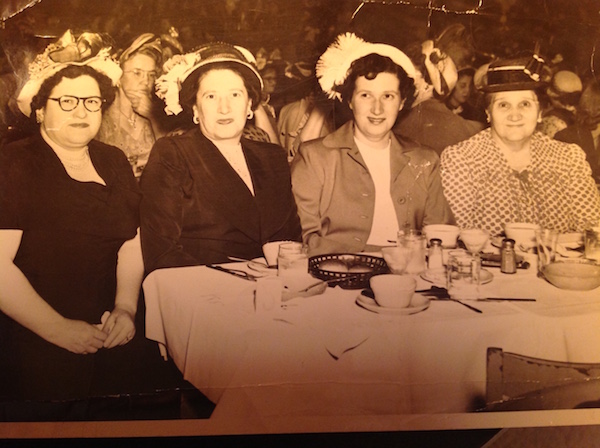
Paper Mommy‘s mother, flanked by two of her five sisters, with her mother (Bubbe)
What would you say was the turning point that helped you identify your calling to work in genealogy organizing?
Jennifer: Since elementary school, I’ve had an interest in genealogy when, in third grade, we did a unit on family trees. In college, I majored in history, and I took a course in writing family histories. In 2009, I got serious again about researching my family using online tools like Ancestry.com. I noticed that many of my clients had genealogy projects they wanted to do once they “got organized.” It was like they wanted to reward themselves with organizing their family papers and researching their trees after they got the rest of their homes organized.
I realized that there was the potential of helping these clients with this additional organizing desire and that my interest and experience fit in well. In this new age of COVID-19, doing genealogy work for clients is great because we can do it virtually. Clients also have more time at home, and they are ready to dive into their trees.
Janine: I started doing genealogy in 2000 but I went about it wrong and ended up with a disorganized mess. So I abandoned my research and in 2011 decided to start again and to do it right this time. (By that I mean, nothing goes in my family tree that’s not a verified fact with a source citation.) By then, I’d had my organizing blog for five years so it seemed natural for me to start a genealogy-organizing blog. I launched Organize Your Family History in 2012.
One thing I know about myself is that I like being new at something. I had a history of gaining a certain amount of expertise in a field and then switching careers. I didn’t want to abandon organizing, since Peace of Mind Organizing was doing well, so I let myself enjoy being a newbie in the world of genealogy, while gradually gaining expertise and followers. The nice thing about genealogy is that there’s always something new to learn so I still feel like a newbie!
Hazel: In 2015, I joined APPO (now known as The Photo Managers). They talk a lot about how important it is to back up, preserve, organize, and share your photos with your family. One of their specialties is genealogy, but what that usually means is helping genealogists organize their photos. Not many photo managers actually do genealogy research. I was suddenly reminded of my own serious genealogy research hobby, which I had put on the back burner while I was starting and running my organizing business. I wasn’t sure if I’d enjoy doing research for others, but I quickly found myself becoming just as interested in clients’ ancestors as my own!
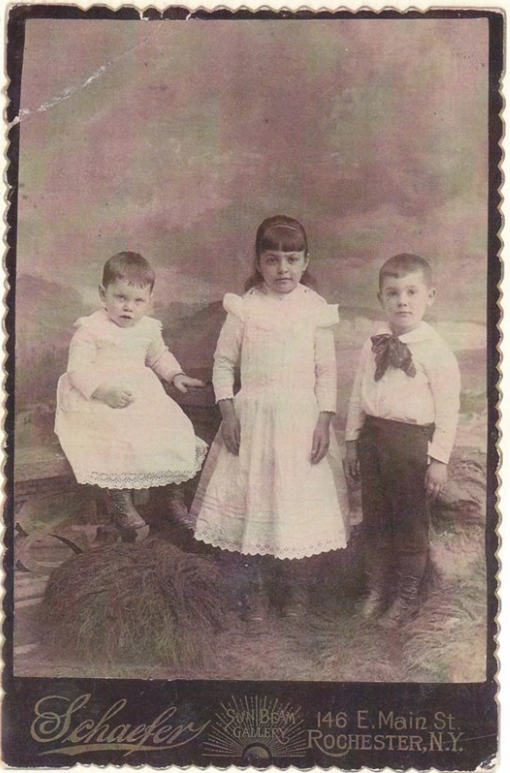
Paper Doll‘s paternal grandfather (far right), circa 1892, with his elder sister and younger brother. They had four other siblings.
I know that you all knew one other from NAPO, but how did you come together? What should people who need your help know about this group? Do you meet? Have Zoom calls? Have wild parties where you pretend to be your ancestors?
Janine: I give Jennifer and Hazel all the credit. They reached out to me and another genealogy organizer, Caroline Guntur, prior to the 2019 NAPO conference in Dallas asking if we’d like to meet up to discuss genealogy organizing.
Hazel: Jennifer and I already were comparing notes occasionally, and came up with the idea of a meeting at NAPO2019. With Caroline and Janine, we four were the charter members of the new Facebook group. Jen is the admin, and the other three of us are moderators. Jen gets all the credit because I didn’t even attend NAPO2019, so she had to find the location, set the time, etc. (I attended virtually.)
The private Facebook group currently has 34 members – mostly from NAPO and The Photo Managers, in the US and Canada … except when Caroline is in Sweden! The “Genealogy Organizers” Facebook group’s “About” section reads as follows:
We are a group of experienced Professional Organizers who work with our clients to help them organize and/or research their family genealogy. The purpose of the group is to support each other and our businesses through sharing information, resources, and positivity. We are requiring that our members have been operating an organizing business for a minimum of a year, belong to an organizing association, and have experience doing genealogy organizing and research.
So, it’s like a SIG (NAPO Special Interest Group) in that we do not teach newbies how to do anything. We do not meet outside of Facebook. I’m open to it, but only if we do NOT have to wear a costume, lol!
[Editor’s note: I am disappointed that there are no historically accurate costumes!]
Jennifer: Once I decided that I wanted to add genealogy organizing and research to what I was offering, I looked around for support and camaraderie. I arranged a time that Caroline, Janine, and I could meet, and included Hazel on Facebook messenger video. We decided to form a group on Facebook, and after the conference, we reached out to NAPO and APPO/The Photo Organizers colleagues. We ask questions, share interesting genealogy news, and talk about upcoming classes. We would have met in-person again, but the NAPO 2020 was canceled due to COVID and the 2021 conferences will be held virtually.
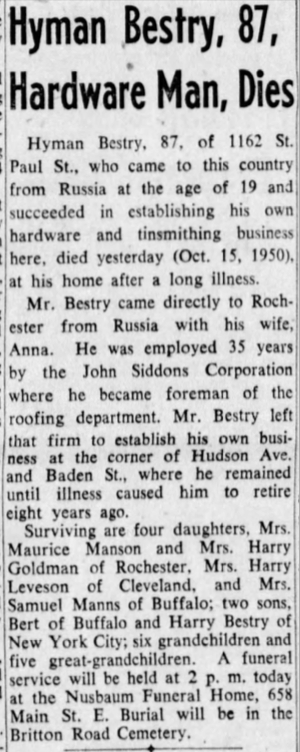
Paper Doll‘s paternal great-grandfather
How do you think your organizing and/or productivity skills help you in this field?
Hazel: Genealogy is really nothing BUT organizing. Organizing dates, names, places, and research materials. Putting like with like, even if it’s misspelled, or barely legible, or contradicts family legend. Recognizing patterns. If you can’t tell that “one of these things is not like the other,” you can find yourself climbing the wrong tree!
Genealogy is really nothing BUT organizing. Organizing dates, names, places, and research materials. Putting like with like, even if it’s misspelled, or barely legible, or contradicts family legend. Recognizing patterns. ~ @Org4Life Share on XJennifer: I can offer my clients ways to file their family history papers and photos in physical and digital formats to help them preserve and locate them for their research. I use my productivity skills to teach my clients how to manage their time, which is quickly sucked away when they fall down the research rabbit hole. It helps me in the same way when I am researching for my clients or myself. Another essential skill that is part of organizing and productivity is attention to detail. Being detail-oriented is an instrumental skill when looking through historical documents to build a family tree.
Janine: Organizing their research is something that most genealogists find very challenging. On my blog, I write about how to organize and ways to think about organizing genealogy research (among other topics). Being able to approach genealogy as a professional organizer allows me to understand their problems and perhaps come up with some solutions.
I’m unusual among genealogists in that organizing my genealogy research is fun for me, so I love thinking, writing and speaking about it. Of course, my experience as a professional organizer informs all my advice!
Do you do genealogical research for your clients, help those who do their own research, or both?
Janine: I help those who do their own research. I don’t do genealogy research for others. I help primarily by writing and speaking but I also work with some clients one-on-one with organizing their research. Sometimes it’s data; sometimes it’s inherited stuff.
Hazel: I do both! Most of my clients have no interest in doing the research themselves. But some do. If they are starting from scratch I teach them how to get started. And, if they are a genealogist who just wants my help breaking through a “brick wall” – or, as we call them in New Mexico, “adobe walls” – I am happy to lend a fresh pair of eyes (and additional resources) to find documents they’ve missed, or to help make sense of what they already have, or to focus their research question in a new way.
Jennifer: I do both. I will help clients get started and go forward on their own. I will look over what a client has already started and check for issues. As our friend Janice Simon has said, I can help clients “de-leaf” when they have “over-leafed” on Ancestry.com. Ancestry uses an image of a leaf to indicate hints of information. People often get over-excited when they begin on Ancestry.com and click on the hints adding them to their trees, without adequately evaluating the data. I will take a look at a client’s tree and remove incorrect information.
Additionally, I will take the basic information a client has and build a tree for them. If they want, I can go deeper into the details to further develop their ancestors’ story. I will put it in a shareable space where family members can add their memories to the collected data.
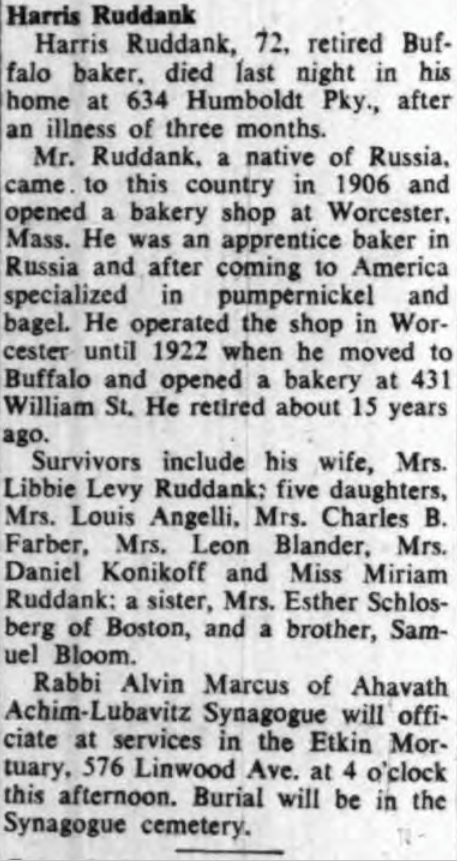
Paper Doll‘s maternal great-grandfather (Paper Mommy‘s grandfather, the baker who “specialized in pumpernickel and bagel”)
What’s the funniest, kookiest, or most interesting anecdote you can share from your work in genealogical organizing?
Hazel: I’ve determined that I’m (very distantly) related to two of my clients! My roots here in America run very deep. I’ve found that if my client has similar, Western European, origins, and if I notice an unusual common surname in their tree, I can run it back a few generations to see if their tree intersects with my own. When that happens, it’s fun for them too!
Janine: I attend a lot of genealogy conferences and in 2015 I attended the Genealogy Society of Southern Illinois’ one-day conference. There was one speaker for the whole day, Joshua Taylor, who is a bit of a genealogy celebrity. (He’s one of the hosts of PBS’s Genealogy Road Show and has serious genealogy cred.) Near the beginning of the first of his four talks he mentioned one of his own ancestors. I quickly consulted my family tree and confirmed my suspicions that we shared that ancestor. I excitedly went up to him after the first talk and told him about our relationship. (I think we are fifth cousins once removed, which might not sound like much to a non-genealogist, but I think it’s a big deal.) I’ve enjoyed a bond with him ever since. I’ve heard him speak many times and have featured him on my blog and collaborated with him through a Family Tree University class I hosted. He’s a great guy.
Jennifer: Finding the articles about your great-aunt’s 200lb wedding cake was pretty kookie. [Editor’s note: It sure was! Not even Paper Mommy or her cousin, the daughter of the bride, had seen that clipping!]
I’ve been working with a client on the Italian part of her family. One of the stories I heard from some of her relatives about her great-great-grandparents who owned a bar/tavern in New York around 1908. The “Black Hand” moved into the area and threatened business owners that their children would be kidnapped for ransom if they didn’t pay protection money. Worried about their children, the family sold the bar and moved back to Italy. They received enough money from the sale of the bar to buy a decent-sized farm in Italy.
What’s the most interesting thing about your OWN family history you’ve uncovered?
Janine: My great great grandfather, Benjamin Franklin Igleheart (1945-1913), was a Civil War Veteran who served as a substitute. He was not drafted but, rather, was paid by a man, Jacob Gish, who had been drafted and did not want to serve. I was able to find their contract; Benjamin was a couple of months shy of his 18th birthday when he signed on. I don’t know, however, how much he was paid. I’m sure glad he survived (obviously)!
Hazel: Oh, gosh, where to begin? The time my maternal grandparents raised their family in a gangster hideout? (Yikes!) The fact that I come from a long line of Quakers, the very knowledge of which completely skipped a generation or two? (How?) That one of my Quaker ancestors was a Loyalist? (Huh?) My slaveowner ancestors? (Ugh!) The time my great-grandmother and her unborn baby died of the Spanish Flu, leaving my 14-year-old grandmother to raise her three younger brothers and two-year-old baby sister almost single-handedly? (Awww.) The origins of the famed Iowa State Fair, formerly the Thornton Farmstead? (Cool!) I love writing family stories, and many of them can be found here.
Jennifer: I am trying to uncover what happened to one of my great-grandfathers. I hope it will become an interesting story. I have heard that he abandoned his family in Chicago sometime in the 1920s by running off with a female cousin. I know he was with his family in 1920 because he is on the U.S. Census record with them that year. But by the 1930 Census, he wasn’t. I’m trying to figure out if he did run off with a relative, where did they go, and when did he die? We have a pretty distinctive last name, so did he change it to hide, and that’s why I can’t find any other records? There aren’t many relatives left around that may know more facts about him.
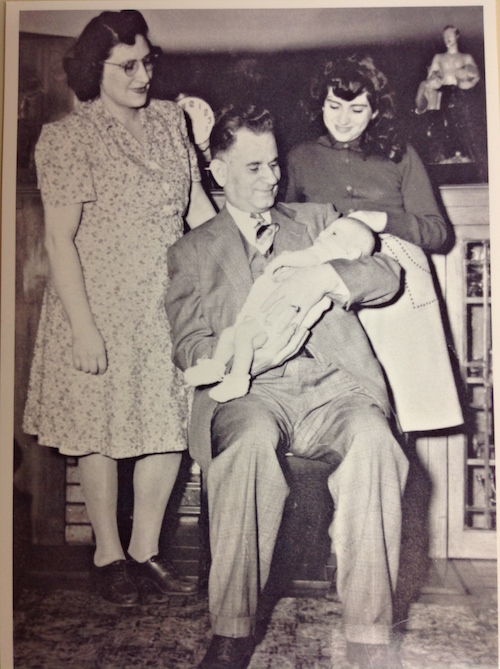
Paper Mommy, circa 1947, with her parents and baby brother
What’s the hardest aspect of genealogy organizing?
Jennifer: So far, for me, the hardest aspect of genealogy research is pulling back when I am finding great information for my clients, but they have only paid for a specific amount of work. I get a charge out of finding new details, and I don’t always want to stop. I also think that carving out this niche is tricky. We are trying to bridge this area that is part Professional Organizing and part Professional Genealogist—making people aware that several of us are here and able to do this work. We can organize your very special family documents and photos, and we understand and appreciate their significance.
Janine: In terms of organizing my own genealogy research, I think the hardest part was putting in place a system that works for how I think. Once I got that locked in, the hardest part became taking the time to do the organizing of the documents I find; that is, analyze the documents, enter the facts into my database and create a source citation before moving on to more research. Try as I might to avoid it, I often find myself with a backlog of documents to process.
Hazel: The hardest for me, and the most important, and the first thing, is to manage client expectations. Genealogy research is a never-ending project, so it’s important to define the project and pay attention to scope creep. If I’m doing research for a client (and not just helping them organize their papers, files, and other genealogy-related materials), I explain that we can “go wide” (i.e. find your 8 great-grandparents); “go deep” (trace one branch back as far as we can); or “focus” on a particular ancestor, location, and timeframe.
When you’re not organizing or delving into genealogy, what’s going on in your life?
Hazel: Before COVID or after? Ha! Actually, I’m writing a book that combines my interest in genealogy, photos, storytelling, memorabilia, and downsizing now so your loved ones don’t have to later. It’s called What’s a Photo Without the Story? A Guide to Leaving Your Family Legacy. Progress on the book during 2020 was replaced largely with Netflix. Fortunately, it was already well along, and I am back at it now. (Click on the title, above, to follow my progress.)
Jennifer: When I’m not organizing or delving into genealogy, I like to spend time with my husband and our four dogs. I enjoy working on craft projects and reading, primarily non-fiction.
Janine: I co-host a podcast called Getting to Good Enough, about letting go of perfectionism so you can do more of what you love. I’m a knitter and spend an inordinate amount of time knitting and watching TV. My husband and I have a wonderful standard poodle, Bix, whom we take great delight in. I also enjoy hand lettering. I honed that skill while writing thousands of postcards to voters between 2018 and 2020. As a new pursuit, I’m trying to learn American Sign Language for the fun of it. Oh, and right now I’m wearing the same dress every day for 100 days. That will end on March 13. It’s been fun!
National Genealogy Day is coming up on March 13, 2021. If you’d like to celebrate with a deep dive into your family history, consider contacting Janine, Hazel, or Jennifer for guidance.
Janine Adams‘ genealogy site is Organize Your Family History. You can order Janine’s three current Orderly Roots Guides (10 Secrets to Organizing Your Genealogy Research, 10 Things I Wish I’d Known When I Started Doing Genealogy, and Organizing Your Genealogy Right From the Start) and forthcoming book at this site.
Reach out to Hazel Thornton at the Genealogy Services section of her website. If you’re an organizer (or want to live like one), you can acquire her Original Clutter Flow Chart, designed to help her clients continue decluttering when she wasn’t right there by their sides, followed by a whole collection of flow charts, which she custom-brands for other organizers. As noted above, Hazel’s current book is in-progress, but her real-life tale will captivate trial and true crime buffs — Hung Jury: The Diary of a Menendez Juror.
Professional Organizer & Family Historian Jennifer Lava can be reached through her site, JenniferLava.com, where you can read her blog and learn about her organizing, genealogy, and speaking services. I can’t guarantee that she’ll find you a 200-pound wedding cake, but I bet she’ll find the sweet spot in your family’s history.




Follow Me